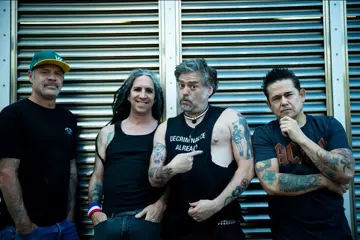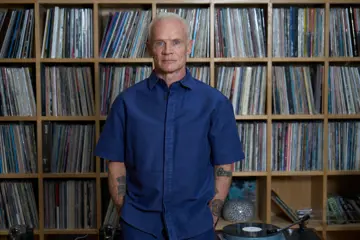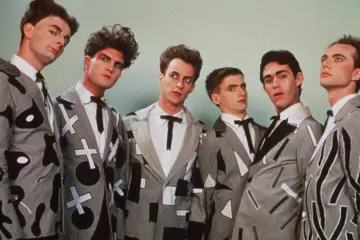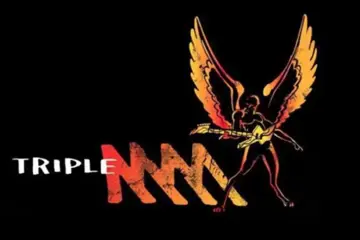 Regurgitator
RegurgitatorEven though these days the concept is quite de rigueur, of all the bands that you'd expect to take the revivalist road and play some of their classic albums in full Brisbane's Regurgitator aren't one who'd readily spring to mind. They've always been known as a forward-thinking bunch, more likely to be setting the pace and analysing new trends and recent developments than wallowing in past glories. But that's exactly why the announcement of their RetroTech 2012 tour – which finds them playing their 1996 debut Tu-Plang and its 1997 follow-up Unit back to back – isn't completely a surprise: this is a band who are not beholden to convention, and who will steadfastly do what they want when they want to do it. Just don't expect them to enjoy it.
“Never! But sometimes you just have to do it,” deadpans vocalist/guitarist and founding member Quan Yeomans, before breaking into a hearty laugh. “No, it'll be fun. We've kind of had a taste of it with the last little run of Unit shows that we did. It has its positives and negatives – it's a very controlled environment, as opposed to our normal chaotic shows, which can be a little bit restrictive, but I think people really enjoy [it] so it's all good.”
The Unit shows that Yeomans is referring to were when the 'Gurge played that album in its entirety during 2011's Falls Festival run, which in turn provided the impetus for the RetroTech concept.
“The idea had been floating around for a couple of years, and then we just thought, 'Why not?'” he continues. “The timing seemed to be pretty good, and there seemed to be a lot of demand for it – people were really interested, so we thought, 'Fuck it, why not?'”
Don't miss a beat with our FREE daily newsletter
Yeomans started Regurgitator back in 1993 with partner-in-crime Ben Ely (bass/vocals) and drummer Martin Lee (who was replaced in 1999 by Front End Loader's Pete Kostic), and by the time Tu-Plang was ready to drop in 1996 they'd already made quite a stir locally with two 1995 EPs (Regurgitator and New) and the increasingly ubiquitous Blubber Boy single which preceded the album.
“We were incredibly excited about it all, and there was a real buzz around us at the time,” Yeomans recalls. “We were just hitting that creative peak as a young band at the time – everyone was arguing heaps already, and there was a lot of tension and a lot of good creative tension going on as well. So we were all starting to feel it definitely, and just for us being in the studio – because we were so young – and working with [renowned producer] Magoo, that was enough. We didn't really care that much about anything else, and playing live was really great fun as well, so we just got swept up in it I guess.
“I think we'd got really, really lucky with a couple of the early supports that Paul [Curtis – manager] organised – we played with Primus really early on in our career to like a thousand people, and we managed to get the [Red Hot] Chili Peppers support as well not that far into it, so we were really, really lucky that we scored those supports. And we were the kind of band that was so weird and awkward and different compared to a lot of the other bands who were around at the time, so we couldn't really help but make some kind of impression on people.”
Signing to major label Warner Music prior to releasing Tu-Plang didn't curb Regurgitator's enthusiasm either, the fact that the first song on their major label debut was called I Sucked A Lot Of Cock To Get Where I Am reeks of a band granted full creative control.
“Yeah, I mean we had a couple of arguments [with the label] – particularly early on – but if you're selling records, that's enough for them generally,” Yeomans smiles. “They'll say their piece, but I don't particularly remember worrying about I Sucked A Lot Of Cock... being called that on the album, or stuff like that. These guys are salesmen and that's what they do best – and they're good at what they do – but if you're selling stuff you can usually get your way. If you stop selling shit things change obviously, and they want to sit in on sessions and they want creative input sometimes, which is just a nightmare, but we certainly got away with a hell of a lot at the beginning, for sure.
“It was all worked up pretty quickly, and we had this deadline so we just moved really quickly on it. Back then, we were actually rehearsing a lot more than we do now obviously, and we had a back catalogue of riffs that we wanted to get out there – just that exuberance that you have when you're young and into something that you're doing – so that was just the way we approached it, we didn't think about it too much.
“The thing about this band is that there is a kind of unconsciousness about it – maybe a lot of bands are like that in their early phase and that's what gives them their edge, because you're not self-conscious yet and you haven't had any success to drag you into self-analysing and wondering why you've made it this far and how you can keep going. When you don't have that it gives you that raw edge.”
For a debut album from a fledgling band Tu-Plang did incredibly well, but that was nothing compared to the reception that its follow-up Unit received the following year – that record dragging Regurgitator to a whole new level on the back of a raft of irrepressible radio singles.
“I'm not sure how successful the first record really was at the time,” Yeomans ponders. “I don't know how long it took to get platinum, I think it maybe didn't kick on until after Unit broke, so I think we were still a relatively underground band and didn't really crossover into that mainstream area until (February 1998 single) Polyester Girl, I guess – that was completely different, and that's when the crowds changed. We were lucky with the new triple j set-up that went national around the same time, we were playing big shows before then but I don't think we crossed over until after that.”
Unit was completely different in tone to its predecessor, and in typical Regurgitator fashion it noted this by kicking off with the self-deprecatingly hilarious I Like Your Old Stuff Better Than Your New Stuff. “That song kind of set the tone for the record – we were listening to a lot of Devo and a lot of '80s stuff, but we were umming and ahhing about what we should do for the sophomore record,” Yeomans chuckles. “We're the sort of band who didn't give a damn about what other people thought of us, so we just thought that we should do a complete 180 and put out something that would piss our old fans off, and see how many people were flexible enough to follow us.
“If you listen to it it's a much more user-friendly record, and it does sound like a commercial record even though it's weird – it's a really odd record. The thing I get listening back to those records is that they're pretty weird records, and there's not many bands that fall into that category that do that well, so I was really surprised. And I was super-critical of that record as well: I basically said some really negative things about it, and I remember Ben pulling me up about being so negative about it in the press. In a way, it works for you if you can be the best critic of your own stuff – reviewers and people who aren't really into you don't have anywhere to go, so in some ways it does work for you doing that. And I was just being honest, I thought it was childish and poorly put together and amateurish. We recorded the thing on ADAT for god's sake – it's a really harsh-sounding record, and I think Magoo did a great job with the gear we had for sure. I think it stands together as a really eclectic piece, and certainly in a weird kind of timeframe as well, which makes it really kind of stand out.”
There's a fantastic humour inherent in the work of Regurgitator, in Yeoman's songs particularly – does he consider this to be an important or integral part of his craft? “I think it's just the way you look at life – some people look at it as a tragedy and some people look at it as a comedy, and I think I've always been on the comedy side of things,” he posits. “There's no point getting anxious about it, because it's going to be over so bloody quickly, so you might as well make fun, have fun and not take it too seriously. Don't make decisions that put you into those ridiculous positions that stress you out or make you anxious or make the world seem like a ridiculously difficult and serious place because it isn't really – it's a silly thing that passes. Everything passes. That's always been inside me and it's always come out in my music.
“It is kind of an era thing as well – for a while there things got a lot more serious, and you didn't see that much humour crossing over into the musical side of things. It was either like 'musical comedy' or it was serious music made by serious musicians, there wasn't that crossover until a while after that era. I think it's a cyclical thing, like everything – a big fucking sine wave going up and down.
“But I think the great thing about the band is that we bounce from one thing to the next, so not all of our songs are gaggy and not all of our songs are serious. Ben and I get a good balance as well off each other – we have different strengths and we play off each other quite well – and that competitive spirit was certainly there in those first couple of records, particularly Unit. He would try a bit of humour and I would try a bit of seriousness and we'd mix it up throughout the record. I think it's about maintaining some kind of balance, whether it happens intuitively or whether you have to think about it, but I think the more intuitive it is, the more successful you're likely to be, because people respond to honesty more than anything else.”






































